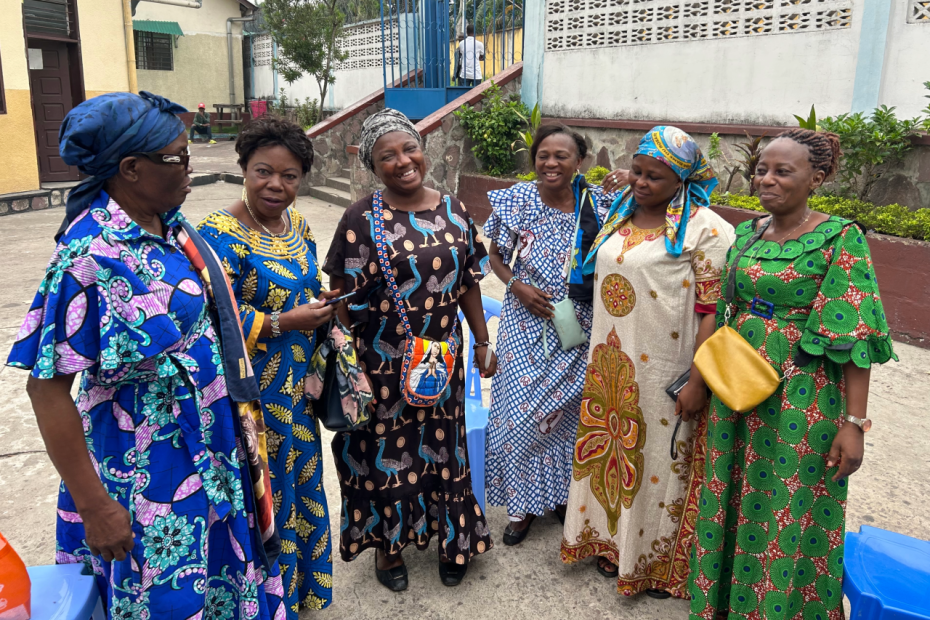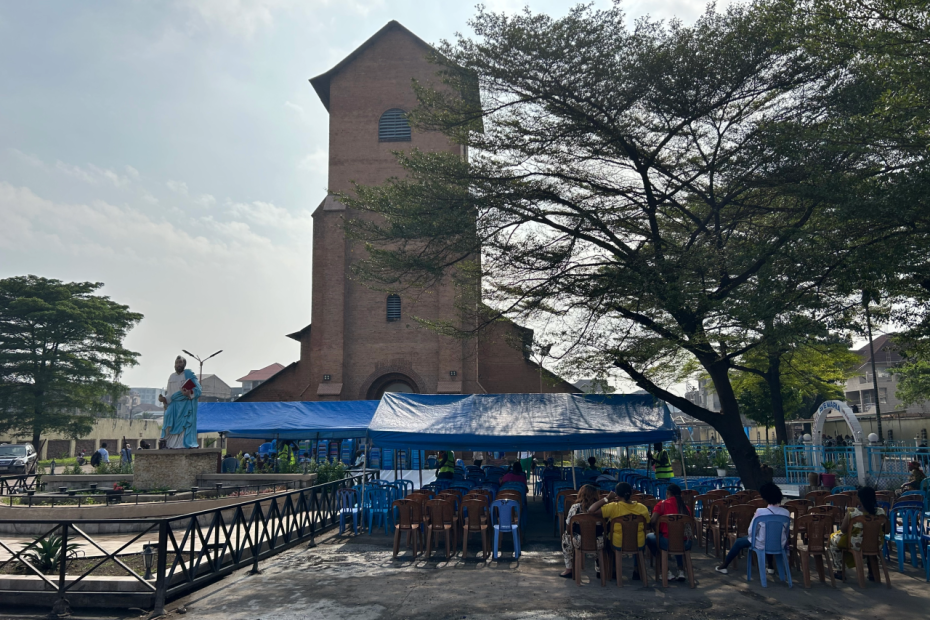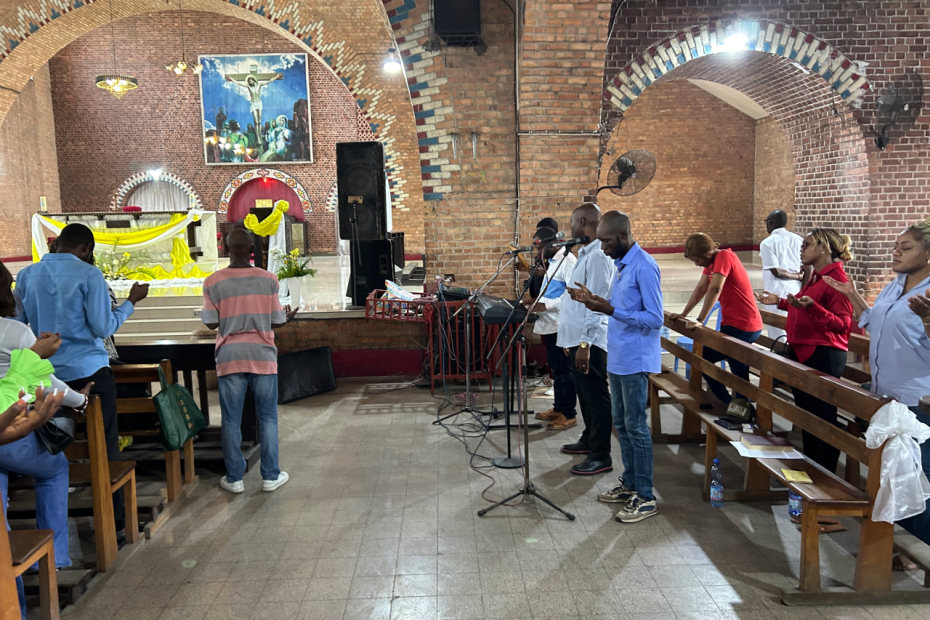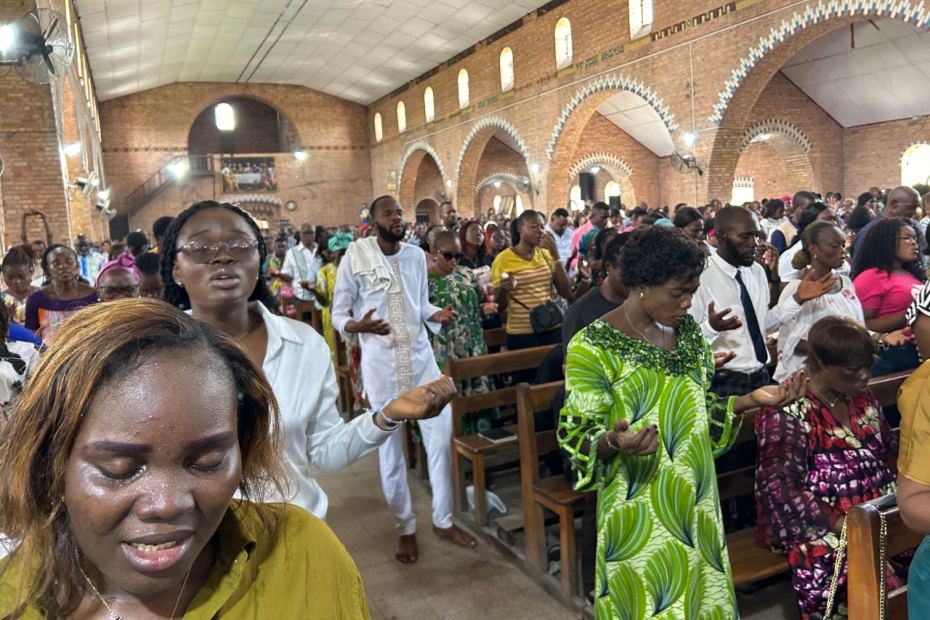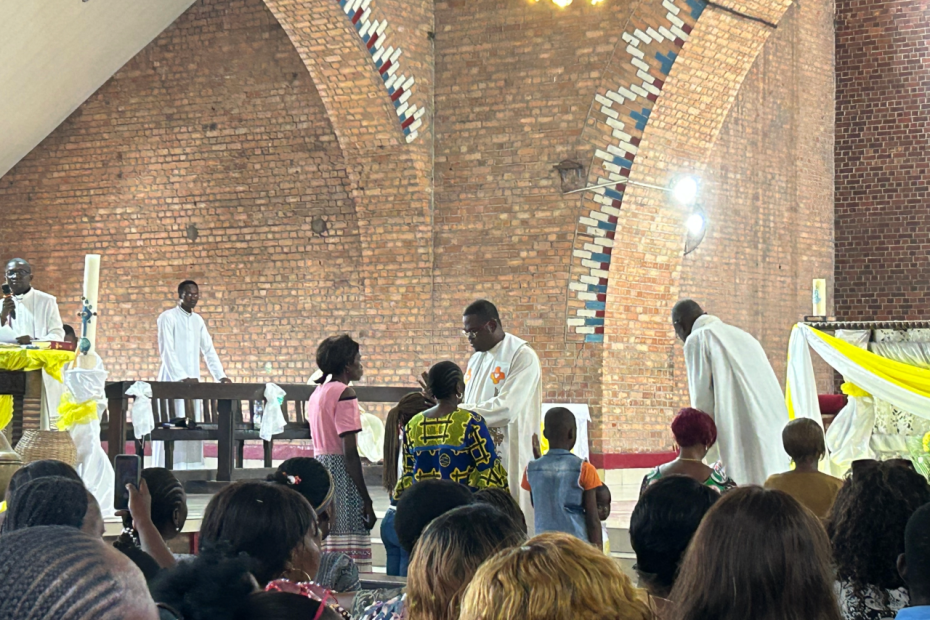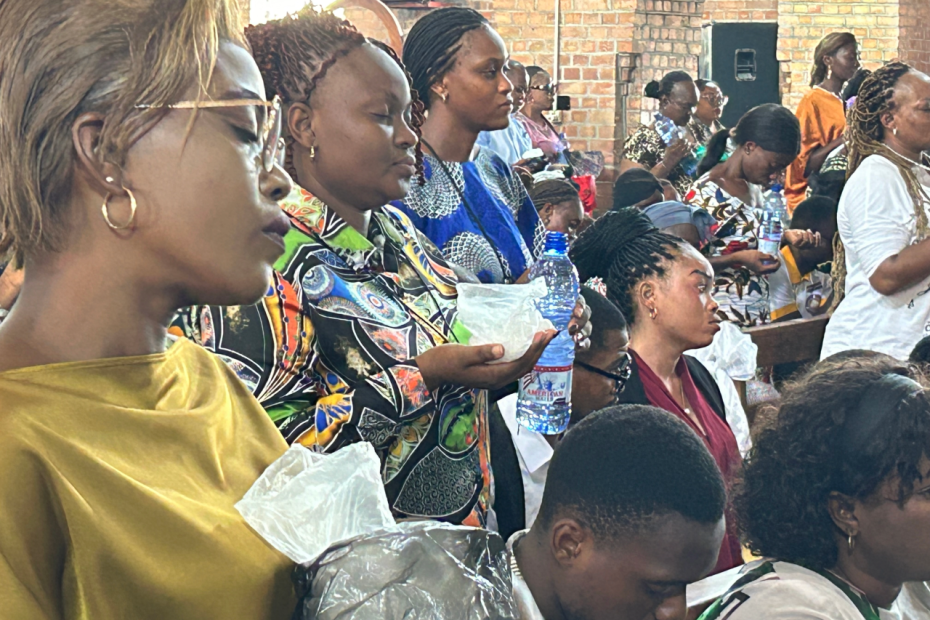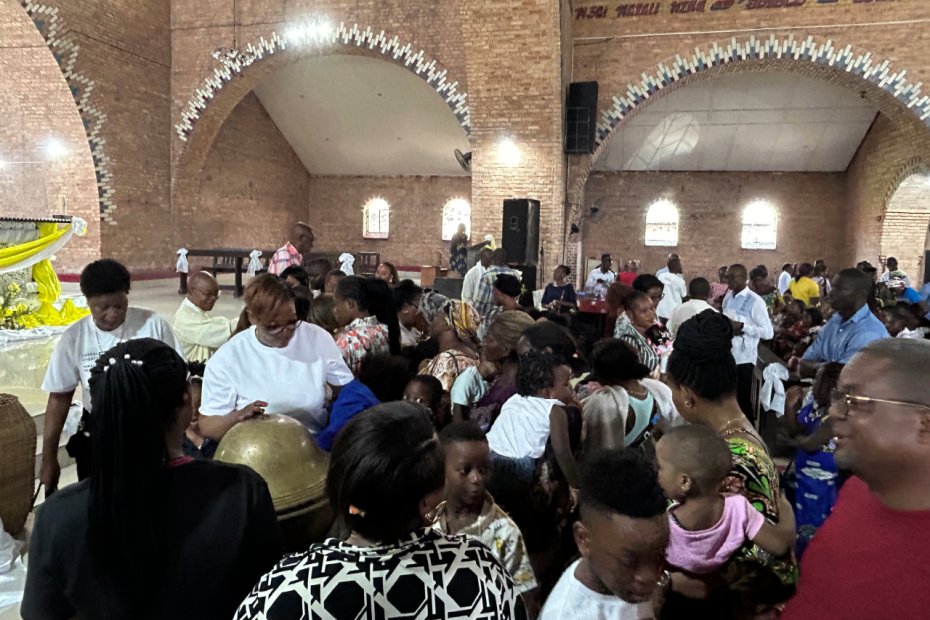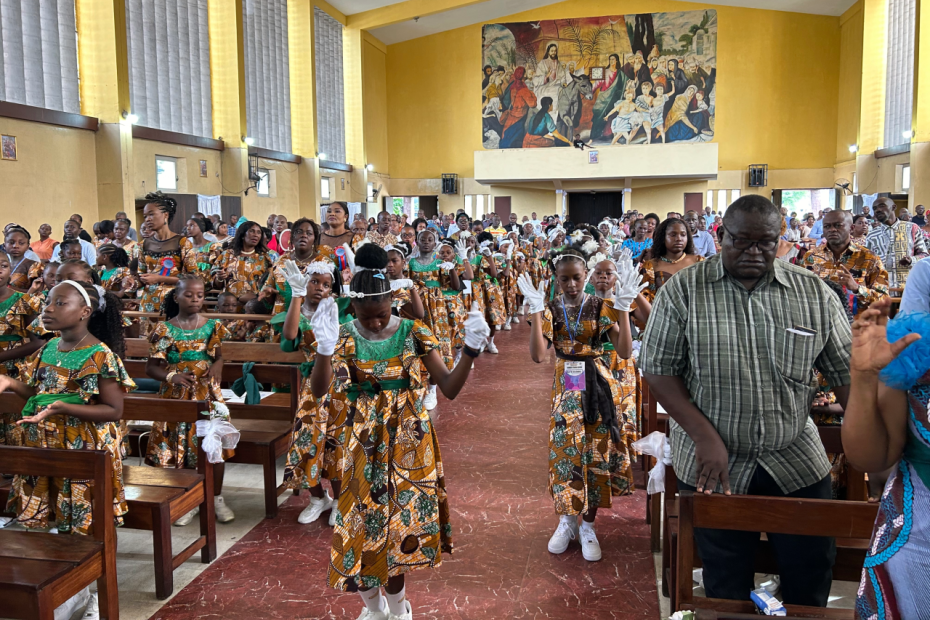Kinshasa is home to a wide variety of lay Catholic groups that function through local parishes. These groups include the Legion of Mary, prayer groups devoted to the Sacred Heart, basic ecclesial communities that each have a neighborhood chapel or meeting place, charismatic renewal groups, “Christian family” groups for couples and their children, choirs (several of them in most parishes–one parish reported having nine choirs with about 800 members), and a handful of groups for young peoples’ formation.
One goal for research on Catholics & Cultures is to represent the variety of places, not only in parishes, where religion is part of Catholics’s lives.1 Despite requests for help identifying lay-organized settings for prayer, pilgrimage sites, and Catholic movements that were not organized within the structures of parishes, interviewees regularly shifted attention back to organizations and movements organized through parishes and the diocese, failing to identify alternatives. More than many places in the world, it seems that Catholicism in Kinshasa is organized through parish and diocesan-run organizational structures.2
Asked what I was missing, one priest answered, “even the shrines are organized by the parish. Maybe this is the… the pastoral strategy of the missionaries when they came here. Catholicism was truly within the parish.” This concentration within the parish may help explain why Catholicism is not very materially visible in public spaces outside of parish walls in Kinshasa.
One lay organization that Kinshasans often mentioned and described as vibrant and influential is Mamans Catholiques, Catholic Mothers, which is organized at the diocesan level and linked to parishes. An impromptu request to speak with members of Mamans Catholiques early one weekday morning after a sunrise Mass provided an initial opportunity to learn more about the movement. The discussion brought together a talented group of women from among the approximately 75 people who had come to that morning’s Mass.
These mamans credited the foundation of the movement to Cardinal Malula, who transformed the Church in the DRC and founded many Catholic organizations precisely when the government was trying to eliminate any movement not designed to promote the ruling party’s ideology. Malula is remembered in significant part for his work on inculturation, but the women suggested that the Mamans Catholiques were founded to upend part of traditional culture. Before the movement was founded in 1986, one of the members said, “were not active.” Malula wanted a “mother to be able to develop, to be able to emancipate herself, so that the mother could do something, so that she could not remain [where they were]. He wanted the mothers to become more developed, to do something important.”
Judging by the members’ comments and their achievements—this group included a judge, a businesswoman, a lawyer, an inspector, and a civil servant in the Ministry of Education—that vision for empowerment turned out to be very successful. All of the women described their ongoing participation in Mamans Catholiques as an experience of empowerment. “Women can and should learn from each other and are better off when they do,” one told me. “For us,” one said, participation is “a form of strength, of coming together.” “It’s not something that men think they need,” another added.3
At the same time, one maman emphasized, the movement’s vision is grounded in fostering a strong faith life. Malula, she said, “wanted the mother, first of all, to be able to sanctify herself.”4 “It's prayer first. Prayer is the center,” another added. The mamans organize retreats and prayer gatherings, one said, so that they “can sanctify themselves and sanctify others.”
Participation also involves charitable acts like care for orphans, visits to hospitals or prisons, and training and workshops for those in need. They “aid girls in their development, to prepare for life, care for a home, prepare for married life or a religious vocation” and share advice on child-raising. “On a developmental level, we teach mothers how to get by, to how to earn money, run small businesses, to do what we call entrepreneurship, to learn how to make soap, hygienic items, a lot of things…” “Sometimes we invite a lawyer or a doctor” to serve as an example to the women or to teach them how to prevent disease, one woman said.
In this particular parish, the mamans said there were nearly 200 members of the movement, organized into ten groups with distinctive charisms and leadership. “We have the mothers of charismatic renewal, the mothers of Christian families, we have the mothers of the Legion of Mary, the others of the Rosary, the mothers of Divine Mercy, the mothers of the Sacred Heart of Jesus, mothers who work to organize the Masses, the Choir Mothers, so the movement of Catholic Mothers is like a tree.”
Charismatic Enthusiasm
Kinshasa’s religious life has been transformed since the 1980s by the introduction of Evangelical and Pentecostal Churches. Protestant Churches have been integral to Congolese life since the first Belgian colonial encounters, but the growth of Evangelical and Pentecostal churches heralded a new form of prayer and religious self-understanding for Christians here, even if that new form traces its lineage in part to African diasporic religiosity.
In Europe, several Belgian missionaries encountered the Catholic charismatic revival movement. They brought this form of prayer, which has parallels to Evangelical and Pentecostal forms of prayer, to Kinshasa, just as Protestant Evangelical churches were beginning to blossom. With Cardinal Malula’s blessing and despite some local ecclesial resistance, they launched a series of weekly renewal prayer sessions in 1980. As the decade progressed, Congolese laymen and diocesan priests helped it grow into a bigger movement. Current leaders recalled how careful the archdiocese was to ensure that the movement not only talked about the outpouring of the Holy Spirit but also deliberately drew people to the sacraments and called upon the intercession of the Virgin Mary.
A Saturday charismatic adoration service at St. Pierre parish, one of the largest churches in Kinshasa, is packed each week. To accommodate the overflow, the surrounding grounds are filled with chairs, many under tents. People travel from many parishes to join the service. The adoration service attended during this research lasted for four hours, and many worshippers arrived early to secure seats. The service began with lay-led prayers to Mary and moved to prayers thanking and calling forth the Holy Spirit, asking for and announcing the presence of the risen Christ, asking forgiveness, sharing from scripture, and offering prayers of intercession. It ended with a blessing of the people, many of whom held up bottles of water and bags of salt to be blessed and brought home. The blessed salt is seen as a powerful form of protection from evil, a traditional Catholic sacramental that is popular today among charismatics.5
As befits the theme of parish control mentioned earlier, leaders of the movement who recounted its history in interviews consistently stressed the ways that it was molded over time and officially approved precisely to shift and hold its members in a traditionally Catholic lane and direct them into the rest of Catholic liturgical and worship life, not to provide an alternative to it. While the movement has lay leaders, it is also significantly administered and led by clergy equally committed to this form of prayer. As one of them described it, this prevents “slippage and deviations.”
The charismatic movement became and remains attractive, members said, “because there are problems in our families,” and because of “fetishism.” Interviewees described the power and emotions of the prayer as a way to overcome any challenges that dark forces marshaled against them or their families. Attendance at charismatic services was represented as an opportunity for “liberation” from these forces. Some de-emphasized the idea that attendance and adherence were problem-driven, describing the prayer instead simply as an opportunity for “a renewal of life.”
As with many things in Kinshasa, it was difficult to get a real sense of the numbers of those who participate in charismatic prayer across this vast city, but surely this adoration service was evidence of significant vitality in the movement.
- 1The articles on the Democratic Republic of the Congo (DRC) are based on interviews and research in Kinshasa, DRC from March 24 to April 7, 2024 at six parishes: la Cathedrale de Notre Dame du Congo, Reine des Apôtres, St. Alphonse, Ste. Anne, St. Raphaël, and Sacré Coeur,and in several other Catholic institutional contexts.
- 2The focus here is on organizational structures, not on prayer in daily life or in individual homes.
- 3The women reported that there are remnants of a Catholic fathers’ group, though not in every parish. They said the men’s movement has none of the energy of the Catholic mothers’ group.
- 4Interestingly, Cardinal Malula conceived of it as a "Catholic Women's Movement" to “focus on the systematic study of women's problems and on dynamic action for the rehabilitation and promotion of women." The name Mamans Catholiques, Catholic Mothers, seems to have come from a phrase used by a woman leader at a parish gathering. Abbé José Mpundu, “Identité des Mamans Catholiques, selon la vision du Fondateur du Mouvement des Mamans Catholiques de Kinshasa,” La Prospérité.
- 5Salt was once part of the baptismal ritual. A Charismatic leader who was aksed about the practice references the story of Elisha in 2 Kings 2:19-21.
